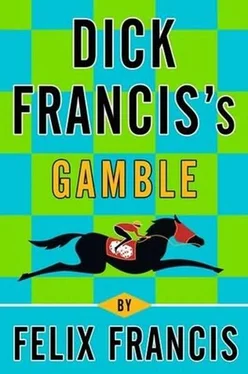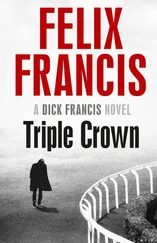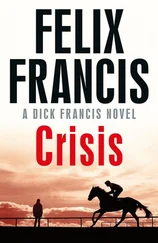The plan worked quite well, up to a point.
At about halfway, my mount and I were some fifteen lengths in front of the nearest challenger and still going reasonably well as we swung left-handed and down the hill. But the sound of the pursuers was getting ever louder in my ears, and six or seven of them swept past us like Ferraris overtaking a steamroller as we turned into the straight.
The race was lost, and it was no great surprise to me, or to the few still watching from the grandstands.
Perhaps the horse beneath sensed a subtle change in me-a change from expectation and excitement to resignation and disappointment. Or perhaps the horse was no longer concentrating on the task in hand in the same way that his jockey’s mind was wandering to the following day’s races and his rides to come.
Whatever the real cause, one moment he was galloping along serenely, albeit one-paced, and the next he had stumbled and gone down as if shot.
I had seen the television coverage. I’d had no chance.
The fall had catapulted me over the horse’s neck and headfirst into the ground. I had woken up two days later in the neurosurgery and spinal-injuries department of Frenchay Hospital in Bristol with a humdinger of a headache and a metal contraption called a halo brace surrounding and literally screwed into my skull.
Three uncomfortable months later, with the metal halo finally removed, I set about regaining my fitness and place in the saddle only for my hopes to be dashed by the horse-racing authority’s medical board, who decided that I was permanently unfit to return to racing. “Too risky,” they had said. “Another fall on your head could prove fatal.” I had argued that I was prepared to accept the risk and pointed out that a fall on the head could prove fatal even if you hadn’t previously broken your neck.
I had tried at length to explain to them that all jockeys risked their lives every time they climbed aboard half a ton of horse and galloped at thirty miles per hour over five-foot fences. Jockeys were well used to taking risks and accepted the consequences without blaming the authorities. But it was all to no avail. “Sorry,” they said. “Our decision is final.”
So that had been that.
From being the new kid on the block, the youngest winning jockey of the Grand National since Bruce Hobbs in 1938 and widely tipped to be the next champion, I was suddenly a twentyone-year-old ex-jockey with nothing to fall back on.
“You will need an education for when your riding days are over,” my father had once said in a last futile attempt to make me take up my place at university instead of going racing when I was eighteen.
“Then I’ll get my education when I need it,” I’d replied.
And so I had, applying again and being accepted once more by the LSE to read for a combined degree in government and economics.
And hence I had come to live in Finchley, putting down a deposit on the house from the earnings of my last successful season in the saddle.
Finchley Central Underground Station, around the corner from Lichfield Grove, was just ten stops up the Northern Line from the LSE.
But it hadn’t been an easy change.
I had become used to the adrenaline-fueled excitement of riding horses at speed over obstacles when winning was the thing. Winning, winning, winning-nothing else mattered. Everything I did was with winning in mind. I loved it. I lived it. It was like a drug, and I was addicted.
When it was snatched away from me, I suffered badly from withdrawal symptoms. An alcoholic with the d.t.’s had nothing on me.
In those first few months I tried hard to put on a brave face, busying myself with buying the house and getting ready for my studies, cursing my luck and telling everyone that I was fine; but inside I was sick, shaking and near suicidal.
Another shower was about to fall out of the darkening sky as I hurried the last few yards along the road to my house with the newspaper.
In keeping with many of my neighbors, I had arranged early on to concrete over my small overgrown front lawn, converting it into an off-road parking space that was now occupied by my aging Mercedes SLK sports car. I had excitedly bought the car brand-new with my percentage from the Grand National win. That had been ten years and more than a hundred and eighty thousand miles ago, and, in truth, I was well past needing a change.
I opened the trunk and looked down at the two coats lying there. The previous evening the sight of Herb’s blue cashmere had almost been too much for me to bear, but now it appeared as just an overcoat without a home.
I picked them both up, slammed the trunk shut and hurried inside as the first large drops of rain began to wet my hair.
I hung my coat on one of the hooks behind the front door and wondered what I should do with Herb’s. He wouldn’t be needing it now but I supposed it belonged to his family and would go back to them eventually.
In the meantime, I hung it up next to mine in my hallway.
I am not quite sure why I went through the pockets. Maybe I thought that he might have left his flat key there as he had been wearing the coat when he had locked his door the previous morning.
There was no key but there was a piece of paper deep in the left-hand pocket. It had been roughly folded over and screwed up. I flattened it out on the wall.
I stood there in disbelief reading the stark message written on the paper in black ballpoint capital letters:
YOU SHOULD HAVE DONE WHAT YOU WERE
TOLD. YOU MAY SAY YOU REGRET IT, BUT
YOU WONT BE REGRETTING IT FOR LONG.
Did that mean Herb had been the real target? Had the assassin actually shot the right man? And if so, why?
Ispent much of Sunday reading and rereading the message on the paper, trying to work out whether it actually was a prediction of murder or just an innocent communication with no relevance to the events at the Grand National the previous afternoon.
YOU SHOULD HAVE DONE WHAT YOU WERE
TOLD. YOU MAY SAY YOU REGRET IT, BUT
YOU WONT BE REGRETTING IT FOR LONG.
I dug out the business card that I had been given at Aintree by the detective: Inspector Paul Matthews, Merseyside Police. I tried the number printed there, but he wasn’t available. I left a message asking him to call me back.
I wondered what it was that Herb should have done, what he had been told to do. And for what, and to whom, had he expressed regret?
I gave up trying to work it out and read about the murder in the Sunday Times . I thought again about calling our boss, but he would read about it in the papers and would find out soon enough that the victim had been his senior assistant. Why spoil his Sunday?
I knew all too well from my time as a jockey that one should never believe what one reads in newspapers, but, on this occasion, I was surprised how accurate the reports were as far as the factual information was concerned. The Sunday Times correspondent clearly had a good link direct to Merseyside Police headquarters, but not so good that he could actually name the victim. And he had little or no information about any motive, but that didn’t stop him speculating.
“Such a clinical assassination has all the hallmarks of a gangland organized crime ‘hit.’” He went on to suggest that a reason the name of the victim was being withheld was possibly because he was a well-known criminal, and the police didn’t want potential witnesses not to bother coming forward.
“That’s rubbish,” I said out loud.
“What’s rubbish?” Claudia asked.
I was sitting in our small kitchen with the newspaper spread out across the kitchen table while Claudia was baking a cake for her sister’s birthday, her long black hair tied back in a ponytail.
Читать дальше












